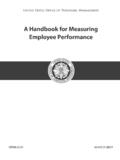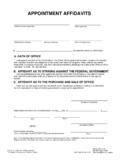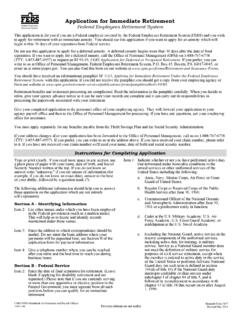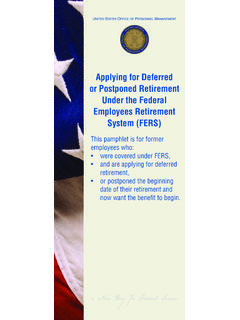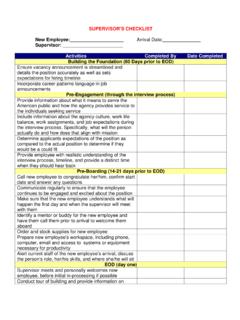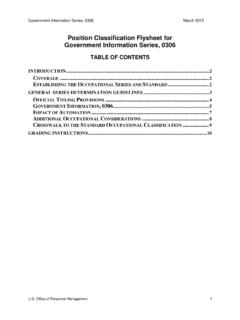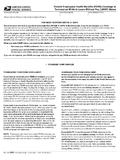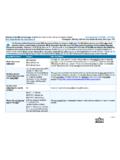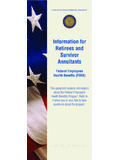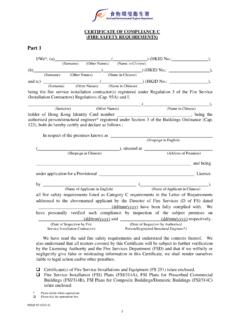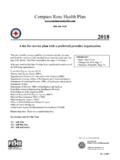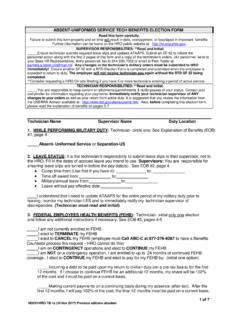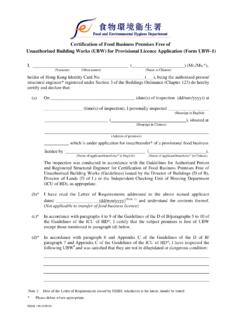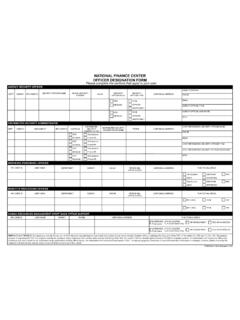Transcription of The Federal Employees - OPM.gov
1 The Federal Employees health benefits Program and Medicare United States Office of Personnel Management Strategic Human Resources Policy RI 75-12 2008 This booklet answers questions about how the Federal Employees health benefits ( fehb ) Program and Medicare work together to provide health benefits coverage to active or retired Federal Employees covered by both programs . It explains what Medicare does and does not cover, who is eligible for Medicare, and how benefits are coordinated between Medicare and fehb plans. iTable of Contents Page What Types of programs are offered by Medicare?.. 1 What Types of Expenses are covered by Medicare?..1 Am I Eligible for Medicare?.. 5 Do fehb Plans and Medicare Cover the Same Type of Expenses?..5 Since I Have fehb Coverage, Do I Need Medicare Coverage?.
2 5 Do I Have to Take Part B Coverage?..6 How Much Does Part B Coverage Cost?.. 6 What Happens If I Don t Take Part B as Soon as I m Eligible?..7 Does the fehb Program Offer Medigap Policies?..7 Do I Need a Medigap Policy When I Have fehb and Medicare When fehb and Medicare Coordinate benefits , Which One Pays First?..7 When is My fehb Plan the Primary Payer?..8 When is Medicare the Primary Payer?..8 If I Continue to Work Past Age 65, is My fehb Coverage Still Primary?..9 I am Retired With fehb and Medicare Coverage. I am Also Covered Under My Spouse s Insurance Policy Through Work. Which Plan is Primary?..9 Do My fehb Premiums Change When Medicare Becomes Primary?..9 Medicare and fehb Primary Payer ii Page Can I Change My fehb Enrollment When I Become Eligible For Medicare?..11 Should I Change Plans?..11 Will My fehb Fee-For-Service Plan Cover All My Out-Of-Pocket Costs Not Covered by Medicare?
3 11 Must I Use My fehb HMO s Participating Providers When Medicare is Primary?..11 If I Go to My fehb HMO s Providers, Do I Have to File a Claim With Medicare?..11 When I Use My fehb HMO s Providers, Do I have to File a Claim with Medicare?..11 Do I Have to Pay My fehb HMO s Copays?..12 I Want to Join a Medicare Advantage Plan. Should I Suspend or Cancel My fehb Coverage?..12 Can I Reenroll in fehb If I Disenroll From the Medicare Advantage Plan? ..12 How Can I Get More Information About Medicare? ..12 Terms Used in This Booklet ..14 The Federal Employees health benefits Program and Medicare - Working Together for You! As an active or retired Federal employee covered by both the Federal Employees health benefits ( fehb ) Program and Medicare, you probably have had questions from time to time about how the two programs work together.
4 This booklet contains answers to the questions that we at the Office of Personnel Management (OPM) are most frequently asked about fehb and Medicare. What Types of programs Are Offered by Medicare? Medicare beneficiaries may enroll in Original Medicare (Parts A and B) or choose to get their benefits from an array of Medicare Advantage Plans (Part C) plan options. Depending on where you live, Part C options may include Medicare Advantage Plans that are approved by Medicare but run by private companies. Medicare Advantage plans offer Medicare health Maintenance Organizations (HMOs), Preferred Provider Organizations (PPOs), private fee-for-service plans (PFFS), Medicare Special Needs Plans, and Medicare Medical Savings Account (MSA) plans. The Medicare Prescription Drug, Improvement and Modernization Act (MMA) established a voluntary outpatient prescription drug benefit, Medicare Part D, effective January 1, 2006.
5 Medicare enrollees are able to receive prescription drug coverage by enrolling in a Medicare Part D plan. Medicare Advantage Plans (Medicare Part C) may also offer prescription drug coverage that follows the same rules as the Medicare Part D coverage. Other Medicare plans include Medicare Cost Plans, demonstration/pilot programs , and PACE ( programs of All-inclusive Care for the Elderly). What Types of Expenses are covered by Medicare? Medicare has four parts. Original Medicare includes Parts A and B: Part A (Hospital Insurance) helps pay for: inpatient hospital care critical access hospitals skilled nursing facility care some home health care hospice care 1 Part B (Medical Insurance) helps pay for: doctor s services ambulance services outpatient hospital care x-rays and laboratory tests durable medical equipment and supplies some home health care (if you don t have Part A) certain preventive care other outpatient services some other medical services Part A doesn t cover, such as physical and occupational therapy Part C (Medicare Advantage): If you join a Medicare Advantage Plan you generally get all your Medicare benefits , which may include prescription drugs, through one of the following types of plans.
6 Medicare HMOs--You must get your care from primary care doctors, specialists, or hospitals on the HMO s list of network providers, except in an emergency. Medicare PPO Plans In most plans your share of plan costs is less when you use in-network primary care doctors, specialists and hospitals. Using out-of-network providers costs you more. Medicare Special Needs Plans These plans generally limit enrollment to people in certain long-term care facilities (like nursing homes); people eligible for both Medicare and Medicaid; or those with certain chronic or disabling conditions. Medicare Private Fee-for-Service Plans In these plans, you may go to any Medicare-approved primary care doctor, specialist, or hospital that will accept the terms of the private plan s payment. Medicare Medical Savings Account (MSA) Plans - These plans include a high deductible plan that will not begin to pay benefits until the high annual deductible is met.
7 They also include a medical savings 2account into which Medicare will deposit money for you to use to pay your health care costs. Medical Savings Account Plans do not cover prescription drugs. Part D (Medicare Prescription Drug Coverage) Under this program, private companies provide Medicare Prescription Drug Coverage and you pay a monthly premium. Federal retirees already have excellent access to health benefits coverage for drugs through participation in the fehb Program. However, if you choose to enroll in Part D, Medicare benefits for drugs will be primary (will pay first) in most cases for fehb enrollees. (Medicare C plans that include prescription drugs will also be primary to fehb benefits .) It will almost always be to your advantage to keep your current fehb coverage without any changes. The exception is for those with limited incomes and resources who may qualify for Medicare s extra help with prescription drug costs.
8 Contact your benefits administrator or your fehb Program insurer for information about your fehb coverage before making any changes. It is important to note that fehb Program prescription drug coverage is an integral part of your total health benefits package. You cannot suspend or cancel fehb Program prescription drug coverage without losing your fehb plan coverage in its entirety (in other words, losing coverage) for hospital and medical services which would mean you might have significantly higher costs for those services. Because all fehb Program plans have as good or better coverage than Medicare, they are considered to offer creditable coverage. So, if you decide not to join a Medicare drug plan now, but change your mind later and you are still enrolled in fehb , you can do so without paying a late enrollment penalty. As long as you have fehb Program coverage you may enroll in a Medicare prescription drug plan from November 15 to December 31st of each year at the regular monthly premium rate.
9 However, if you lose your fehb Program coverage and want to join a 3 Medicare prescription drug program, you must join within 63 days of losing your fehb coverage or your monthly premium will include a late enrollment penalty. The late enrollment penalty will change each year but will be included in your premium each year for as long as you maintain the coverage. Medicare does not cover: your monthly Part B premium or Part C or Part D premiums deductibles, coinsurance or copayments when you get health care services outpatient prescription drugs (with only a few exceptions) unless you enroll in a Part C plan which provides drug coverage or a Part D plan routine or yearly physical exams custodial care (help with bathing, dressing, toileting, and eating) at home or in a nursing home dental care and dentures (with only a few exceptions) routine foot care hearing aids routine eye care health care you get while traveling outside of the United States (except under limited circumstances)
10 Cosmetic surgery some vaccinations orthopedic shoes Complete Medicare benefits information can be found in the Centers for Medicare and Medicaid Services publication, Medicare & You handbook which can be found on the Medicare website ( ). 4Am I Eligible for Medicare? You are eligible for Medicare if you are age 65 or over. Also, certain disabled persons and persons with permanent kidney failure (or End Stage Renal Disease) are eligible. You are entitled to Part A without having to pay premiums if you or your spouse worked for at least 10 years in Medicare-covered employment. (You automatically qualify if you were a Federal employee on January 1, 1983.) If you don t automatically qualify for Part A, and you are age 65 or older, you may be able to buy it; contact the Social Security Administration. You must pay premiums for Part B coverage, which are withheld from your monthly Social Security payment or your annuity.
